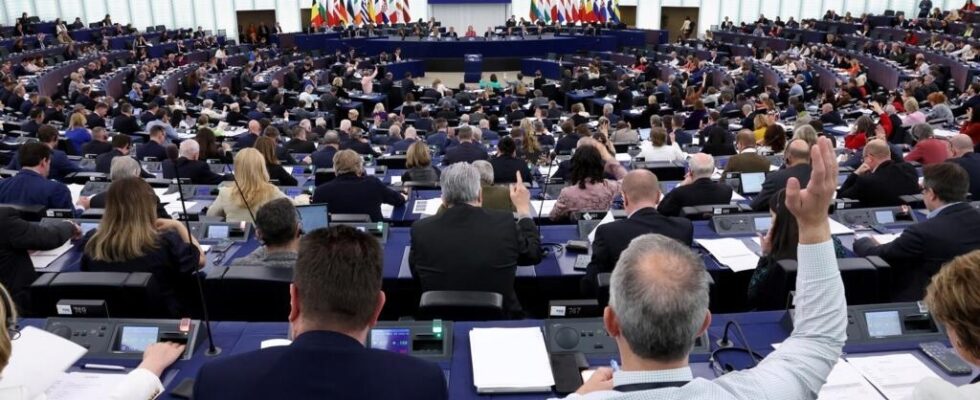The European elections, which end this Sunday, June 9, are extraordinary with some 370 million voters for a vote that takes place in 27 different countries. And it is at the end of this election that the new balance of power will emerge within the hemicycle. Paradoxically, the only European institution elected directly by its citizens is also the least well known in the EU. However, it plays an increasingly important role since the revision of the European Treaties.
Many voters think that the European Parliament still plays an essentially symbolic role today – and the very national character of the European elections certainly does not help to combat this prejudice.
This was certainly the case at the time when Parliament was not directly elected, and even after the first direct elections which were established in 1979. But, since the Treaty of Amsterdam in 1997, and especially since the Lisbon Treaty entered into force in 2009, MEPs play a real role as legislators. “ European laws must always be adopted by two institutions: the Parliament which represents the citizens, and the Council which represents the Member States », Explains Jaume Duch, spokesperson for the European Parliament. “ The Commission is responsible for presenting the proposals, but it is the Parliament and the Council who must agree to adopt European laws. So most of the laws that affect all of us as European citizens are laws that go through the European Parliament, that have to be adopted, amended, adopted by this European Parliament. »
In addition to this role as legislator, there are two major functions: control of the European budget and the inauguration of the European Commission. The 720 Europeans who will be appointed on June 9 will have to approve the appointment of each commissioner, and of course that of the president of the Commission. “ According to the treaties, it is the European Council and therefore the leaders of the 27 Member States who will make the official proposal for the next President of the Commission », recalls Jaume Duch.« But afterwards, it is Parliament which votes, it is Parliament which elects. And moreover, the treaties logically provide that in the event of refusal, the European Council will have one month to present another application. So, the person who wants to chair the Commission must first be appointed by European leaders… But then, they must obtain an absolute majority, more than 361 votes within the European Parliament. »
Read alsoEuropean Parliament adopts groundbreaking legislation on media freedom
The crucial issue of June 9
Ursula von der Leyenthe current President of the Commission who wishes to be reappointed for a second term, will have to gather a majority on his name… and this is therefore one of the major issues of this election. In 2019, the former German Minister of Defense was inaugurated with only 9 votes in advance, and at the end of these new elections she will have to fight again to obtain a majority, which is nothing to worry about. guaranteed. “ Even if the European People’s Party which brings together the right-wing parties comes out victorious, as the polls predict, it will have to deal as it has done in the past with the Social Democrats who should be the second largest group in the outcome of the elections », deciphers Sébastien Maillard, special advisor to the Jacques Delors Institute. “ And the whole issue is to know what the third group will be: the liberal centrists led by the Macronist majority in France? Or, if they do poorly, the Conservatives and Reformers group which will be dominated by Giorgia Meloni? »
Read alsoUrsula von der Leyen, head of the EPP list for the European elections
For now, the Italian leader has taken care not to reveal her intentions for after June 10. But two possibilities are available to the party boss Fratelli d’Italia, which should emerge from these elections in a strong position, and see its number of MEPs increase from 10 to around twenty. Two scenarios are available to the Giorgia Meloni : accept a piecemeal alliance with the conservative right and with Ursula von der Leyen, or respond to the call launched by Marine Le Penfor an alliance of the extreme right in Strasbourg.
Divergences within the far right
“ This second scenario does not seem credible for two reasons », believes for his part Sébastien Maillard, “ because there are ideological and tactical differences between the different components of the European far right. The war in Ukraine has really divided them since Georgia Meloni is pro-NATO and for supporting Ukraine, which is not the case for the RN and the other components of the Identity and Democracy group. Furthermore, Marine Le Pen needs to be in an important group, which carries weight within the European Parliament – and even more so since the break with the German far-right. On the other hand, Georgia Meloni is not at all in the same position as Marine Le Pen: she is in government, she needs to reassure her partners, including with regard to the financial markets. Tactically, she needs Marine Le Pen less than Marine Le Pen needs her ».
No formal alliance, but increased influence: far-right groups could win 25% of seats in Parliament! This will weigh heavily on the agenda and on the directions of European policy in the years to come. With, in particular, a tougher approach to be expected on immigration issues and a growing disinterest in the energy transition and the defense of the rule of law.
Read alsoAt a time of major maneuvers in the European Parliament
